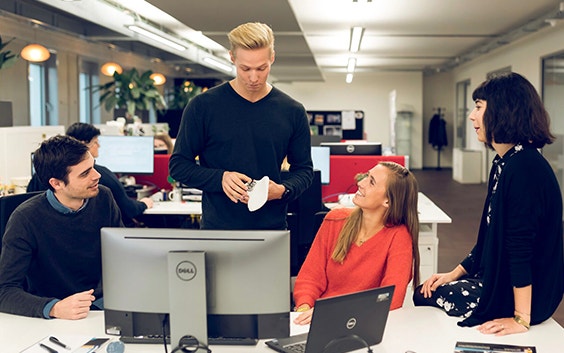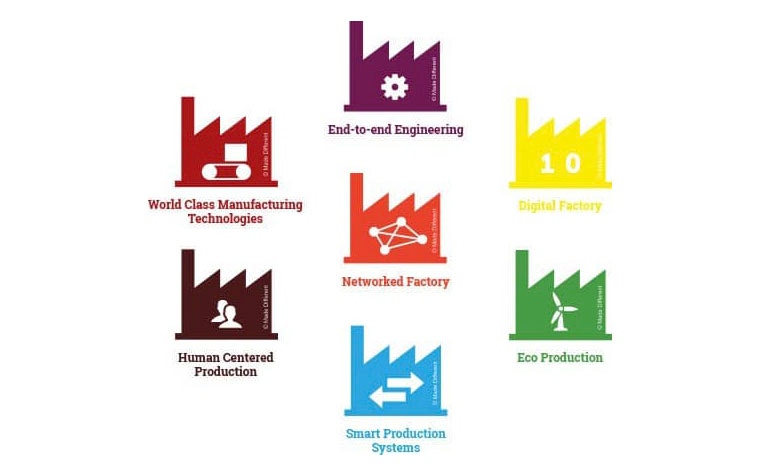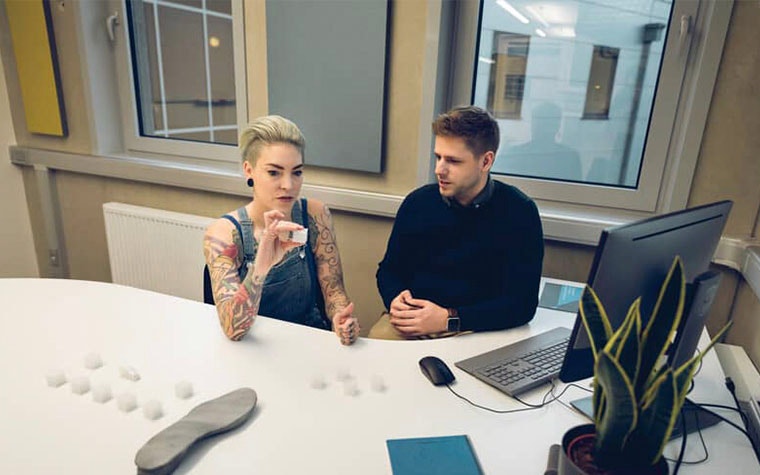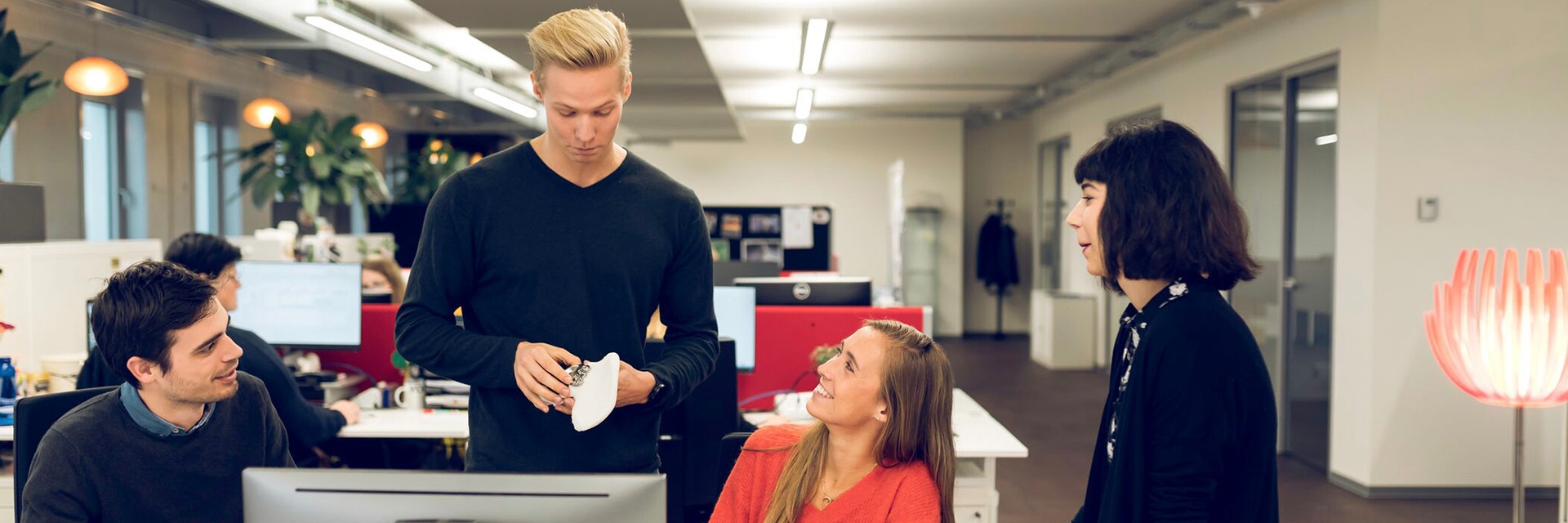EXPERT INSIGHT
The Future Is…Collaboration

When it comes to industrial manufacturing, it’s never just a one-man job. Many minds and hands are involved from as early as the strategy phase and on through the design and manufacturing phases. Materialise knows this from in-house experience and through the many projects built in partnership with our customers.
In 2019, Materialise was recognized as a Factory of the Future by industry platforms Agoria and Sirris. We achieved this award by proving that we met seven key transformations, including using smart production systems in a networked factory, adopting human-centered production, and integrating environmental considerations into all aspects of how we operate.


We are immensely proud of our advances in each of these areas, but none of these achievements could have been met without the one component necessary to be truly effective as a Factory of the Future — collaboration. Not even the most innovative new technology can work in a silo, and that’s why Materialise puts co-creation front and center when it comes to offering our solutions.
Co-creation vs. collaboration
In any successful partnership, dividing tasks according to skill sets is critical for the realization of your goals. But at Materialise, we feel there’s an important distinction to be made between collaboration and co-creation. Collaboration and working to help each customer achieve their desired end result is at the heart of what we do, but to truly push the limits and respond to new challenges, it’s co-creation that we strive for.
Materialise Innovation Manager Sven Hermans explains the distinction well: “Co-creation is more than working together; it's about solving problems. And that only happens when you have a common goal, a common challenge. Whether you're looking to optimize a process or to develop a product, co-creation is an approach to doing it better.”


Materialise has long been a leader in co-creation, calling upon our in-house team of experts and over 30 years of experience in AM production to help our customers improve their offerings and push the creative limits of the technology. By combining our 3D printing competencies and technologies with our customers’ industry and product-specific knowledge, we have always tried to harness the power of collaboration to create meaningful applications that might never have been realized alone.
But not every challenge has a straightforward answer, and sometimes solutions require a longer-term, forward-thinking approach to achieve. For these situations, Materialise is going a step further.
A new “ware” for your business toolkit
Software and hardware are critical components of a digital factory. But the know-how to really optimize how these tools are used is something that is often overlooked. Materialise’s advisory service — Mindware — looks to change this by adding our strategic 3D printing knowledge and expertise to your business innovation toolkit.
In a survey conducted by Materialise in 2019, 41% of manufacturers cited a lack of expertise as a major hurdle in the adoption of 3D printing into their manufacturing process. As Sven explains, this understanding of whether AM is the right direction is fundamental. “It is so important to know whether AM truly adds value or not instead of just hoping that maybe it could add to the business in one way or another.”
And this is what Mindware seeks to do. The Mindware advisory team provides impartial, strategic, and custom solutions to help minimize the confusion and risk that can come with incorporating AM into your business. Whether you’re looking for software to streamline your production workflow, need advice about how to scale up your manufacturing, or have an innovative design idea you need an expert partner to help bring to life, Mindware is about bringing clarity to your goals and business strategy to build a high-value, low-risk plan together.
“Whether you’re looking to optimize a process or to develop a product, co-creation is an approach to doing it better. ”
— Sven Hermans, Innovation Manager, Materialise
Materialise’s team of experts works side-by-side with not only technical teams but also C-level executives to make sure all aspects of a challenge are understood, and our advice is grounded in flexible, long-term solutions. “Mindware,” elaborates Sven, “is a bit like the glue between specialists throughout the organization — we work quite often with research, design engineering, and software because the questions are sometimes so big and so future-focused.”
Collaboration and co-creation are built into the DNA of Materialise and, by extension, Mindware. By fully understanding a company’s business needs and challenges, we can create a roadmap to an effective, individualized AM strategy to achieve upon the journey we take together.
Symbiotic, long-term relationships
Co-creation for Materialise involves partnership, and we’re interested in helping customers meet their end goals, whatever they may be, no matter what the timeline. With the development of Mindware, these partnerships can now build into organic, mutually beneficial relationships over the long term.
The journey to AM adoption shouldn’t need to be completed alone. When we create custom trajectories, we work with customers until the goals have been met and they are completely clear on what to expect from Materialise once the journey is complete, whether that’s workshops, consultations, or trial-and-error prototyping. We also gain industry expertise from our own production experiences to help us continually refine our services and technological capacities.


Part of the excitement of co-creation lies in the challenge. Open-ended questions and big ideas give us the opportunity to use our expertise to push the limits of innovation. “We’re not into just producing parts. We’re taking a holistic view of the ecosystem and the role our core competencies can play in adding value to it, no matter whether the products in question are industrial or medical,” explains Materialise CTO Bart Van der Schueren.
Let’s imagine a global company with prototype machines spread throughout the world knows their machines are not being used in an optimized way. They may know they have communication issues and that, for instance, a plant in North America is struggling with certain prototypes while another plant has an empty machine that could do the job. But because of these communication issues, the North American plant wouldn’t know that they could share their workload while solving their issues internally. There is a lot of potential here to optimize the process and reduce costs by optimizing communication, and that is the type of challenge our experts can explore.
We often tell people, “you can dream big, but you have to start small.” Each step along the roadmap may seem small when working towards a big goal, but as we learn by doing and by trusting in the technology and our partners, this is how we bring projects and our factories flexibly into the future.
Factories of the Future — together
The willingness for companies to explore AM has increased dramatically even from just a few years ago. The limitations of current manufacturing systems are becoming clear as a result of global crises, further highlighting how important digital production systems can be in creating a future-proof business strategy.
Over the last three decades, our experience with our “internal kitchen” of machines, materials, and design processes has given us the knowledge of how to make AM efficient, reliable, meaningful, and scalable. We’ve developed a smart, digital factory that is fully networked for a true manufacturing ecosystem. But more than that, we have become a Factory of the Future by overcoming the same challenges faced by our customers.
At Materialise, we lead by example. By taking a human-centered approach and ensuring collaboration is at the heart of what we do — both internally with our staff and externally with our customers — we’ve leveraged our platform of software tools to manage and control the 3D printing process more efficiently and allow companies to meet the highest standards in the most demanding industries.
But being a Factory of the Future isn’t the final state. This status also brings awareness that there is a responsibility to keep moving forward and to continue to create transformative experiences to make the world a better and healthier place.
We want to share the future with you. By working together and helping you to also become a Factory of the Future, we can continue to push the limits of innovation and together make the impossible possible.
Share on:
You might also like
Never miss a story like this. Get curated content delivered straight to your inbox.
